For the last few years, I have intentionally gone off-topic from Magic around April Fool’s Day to talk about other games I am a fan of. In 2021, I discussed how Pokemon had too many legendary Pokemon over Part One and Two. And in 2022, I asked the all-important question “Could Commander make you a Good Survivor Player?” This year, I’m probably going off-topic the least of the three, as I wanted to examine a different card game which has been brought to my attention in the last six months. I’ll dive into why I think some Magic players may take interest in this expandable card game (or others like it). This week, we hit on the teambuilding and adaptive nature of my newest favorite game, Marvel Champions.
For those readers who may be in the same position I was 6 months ago, a expandable card game is one in which a core set is the essential purchase you need to get your foot in the door and the randomized boosters of your typical trading card game are substituted for packs which have the same established list of cards. What I mean by this within the context of Marvel Champions is your initial investment into the Core Set is everything you need to play the game at its most basic level. Any additional packs you would collect are more analogous to a preconstructed deck in Magic, but with a little bit more. What this results in is a card game you collect like an expanding board game.
Commander, in many ways, was the closest approximation I had for all of the “pick your champion” games which have existed over the last decade and a half. I never got into games League of Legends, Defense of the Ancients, or Overwatch, which all appeared to me – as someone on the outside, looking in – as a games where you find a character who matches how you want to interact with the game and allows you to find identity in the fandom. Now, in many ways, I’m beginning to feel this way about Marvel Champions.
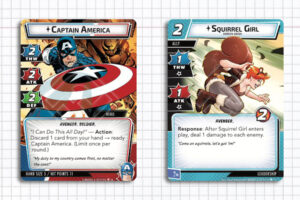
What is Marvel Champions?
As someone who loves all the lore of Marvel comics, and has enjoyed Magic’s deep gameplay for the last two decades, I feel Marvel Champions is the meeting place between those two passions. While the two play very differently in many respects, lessons about elements like tempo, aggression, and resource management can be ported over to help get you up to speed during your first few encounters. The basic summation is that Marvel Champions is a game in which you take on the role of a Marvel hero, armed with a deck comprised of 15 cards specific to that hero and a minimum of 25 cards of the deck builder’s choice. You and up to three other players combat one of over forty different villains.
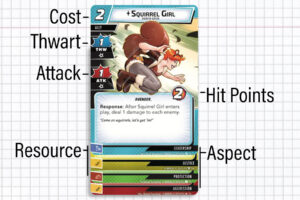
Within the game cards are aligned to four different aspects – aggression, protection, justice, and leadership – of which your deck can only draw from one of these aspects, plus the basic cards which can be played in any deck. The cards in your hand are discarded to pay for the cards you intend to play, and you draw back up to your hand size at the end of the player phase.
Gameplay is a balance of combating the villain and their minions directly, while thwarting the different schemes they enact over the course of each scenario. In the biggest departure from a game like Magic, this is all cooperative, like a game of Archenemy if the archenemy was entirely automated.
Beyond the points I will get to in a moment, I think one of the things speaking to me the most about this game is how deep the comic references go. Realizing there may be a barrier of entry for people who are only aware of Marvel to the extent of the MCU, I will say I believe there are a lot of nuggets to pique the interest of somebody whose knowledge of Marvel is only a few of the films they have seen. The sum of all these elements of gameplay and lore is a game consuming my interest pretty consistently over the last few months. Allow me to explain why.
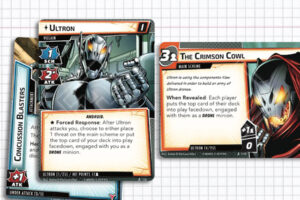
Win Together. Lose Together.
To some degree there’s always been some level of juxtaposition between how I interact with Magic versus some of my peers. I understand wanting to win; there are times when I absolutely want to play competitive Magic and win. But so often I’m looking to enjoy my time with my friends and the game engine of Magic allows me to exercise my entry-level knowledge of politics and card advantage in a way I will probably never grow out of. But because Marvel Champions is an entirely cooperative game, it allows me to grow with my friends in a way which is entirely a team effort, as opposed to an antagonistic perspective.
Because you are cooperating with other players, you are winning and losing together. This is best exemplified by a game I played against Magneto. My understanding is Magneto has proven to be one of the more challenging villains, especially on a blind playthrough. During the first encounter my friend and I made against Magneto, we ultimately lost. But I wasn’t frustrated, just motivated to return one day and ultimately defeat him.
Because you enter into this game with the understanding you may lose, it doesn’t feel so disheartening when it happens. When I finally got the Core Set, I played by myself and probably won one in every six games against the first two scenarios against Rhino and Klaw. But when the victories manifested, it was cathartic. The journey of experimenting with different heroes, trying to find a combination which would allow me to succeed was worth it in the end.
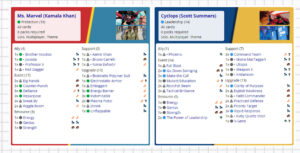
Netdecking is Encouraged
Another boon for this game is that unlike competitive games, there is no shame in netdecking. The first few decks I really fell in love with were because I looked up people’s lists on Marvel Champions Deckbuilder, podcasts, or YouTube content. It gave me a road map of what hero packs I needed to pick up to get specific cards, and ultimately create decks which matched the way I wanted to combat classic villains like Red Skull or the Green Goblin. And while I still go to those resources for inspiration, having a functional deck allowed me to skip over the discouraging playtests and discover different cards which prosper or fail against different scenarios.
Additionally, due to the deck building restrictions present in the game, cards can be contextually different depending on if you are looking to play through different villains in a solo play setting or with multiple players. On your own, you must play with something more well-rounded. In a group, you can tailor your deck to the role you fill; will you deal out huge chunks of damage or will you be responsible for mitigating the threat building up on the schemes? Again, this is what I saw as the draw to so many of the games my friends played throughout the 2010s, that I just never had the time to invest in.
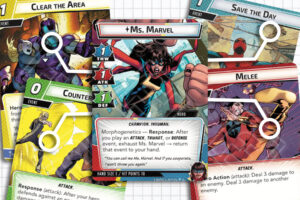
Mix & Match Gameplay
Ultimately, I think the factor which has really sold me on Marvel Champions is the customizability of the entire game itself. Because most heroes such as She Hulk, Ms. Marvel, or Ghost-Spider are designed to be relatively open ended, you can experiment with the four different aspects to tailor your experience to whatever scenario you like. In fact, the greatest bit of “deprogramming” I had to do after all my years of playing Magic was to be okay with dismantling decks after only a few days of using them. I was going to need to have the cards ready for a different hero deck and scenario the following weekend.
But most of all, just as the hero decks are open to any number of different creative liberties, the villain scenarios can be augmented just as much. Each villain has their standard suite of cards for their encounter deck which can be paired with any combination of the game’s modular encounters. Sick of fighting the Masters of Evil when you battle Klaw? Replace them with Frost Giants and crime boss, Tombstone. This allows the comic book fan in me to dream up all the villain team-ups we never get to see, and play out battles which can be narrated the same as any story told on the comic page. All of these factors result in a game which never stops impressing me with the replayability on display.
While the game has proven to occupy a lot of my thoughts over the last few months, I won’t pretend like Magic the Gathering is going anywhere. The two games feed into my love of gaming, but hit on different aspects I enjoy. Whereas Magic the Gathering requires me to dig into my repository of political backstabbing, Marvel Champions allows me to team up with my friends and go on an adventure taking place on the tabletop. It’s the same joy I received playing Dungeons and Dragons in the past. I think if the other expandable card games are anything like this, there has to be one that will speak to any number of Magic players everywhere. Thanks for joining me.
Ryan Sainio (he/him) is a Graphic Designer exploring the Commander format and Magic history on a regular basis. Notable decks that value flavorful and fun gameplay over competitively optimized decks include Shattergang Eldrazi, Doran Soul Sisters, and Chatterfang ProsBloom.
MTG Content Creator Awards 2022 nominee: Format Specialty Writing & Excellence in Writing Overall

